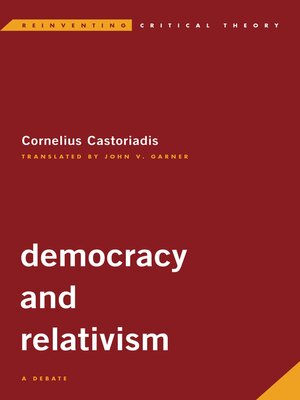
Sign up to save your library
With an OverDrive account, you can save your favorite libraries for at-a-glance information about availability. Find out more about OverDrive accounts.
Find this title in Libby, the library reading app by OverDrive.



Search for a digital library with this title
Title found at these libraries:
| Library Name | Distance |
|---|---|
| Loading... |
In this vibrant debate with intellectuals influenced by Marcel Mauss, including Alain Caillé and Chantal Mouffe, the incisive Greek-French activist and philosopher Cornelius Castoriadis addresses the challenge of critical thinking in an international context.
The first half explores the tradition of radical self-critique and the prospect of affirming its value in a non-ethnocentric way. While defending ancient Greek contributions to the Western tradition of radical self-critique — including the practice of "relativizing" one's own culture, of engaging in philosophical interrogation, and of establishing democratic institutions — Castoriadis is challenged to explore the trans-contextual features of any self-critical, or "autonomous," social institution. In the second half Castoriadis offers a penetrating critique of representative democracy, and the discussion makes important strides toward a new conception of direct democracy, of political education, and of the institutional prerequisites for the continuation of radical self-critique in politics and philosophy.
The first half explores the tradition of radical self-critique and the prospect of affirming its value in a non-ethnocentric way. While defending ancient Greek contributions to the Western tradition of radical self-critique — including the practice of "relativizing" one's own culture, of engaging in philosophical interrogation, and of establishing democratic institutions — Castoriadis is challenged to explore the trans-contextual features of any self-critical, or "autonomous," social institution. In the second half Castoriadis offers a penetrating critique of representative democracy, and the discussion makes important strides toward a new conception of direct democracy, of political education, and of the institutional prerequisites for the continuation of radical self-critique in politics and philosophy.







